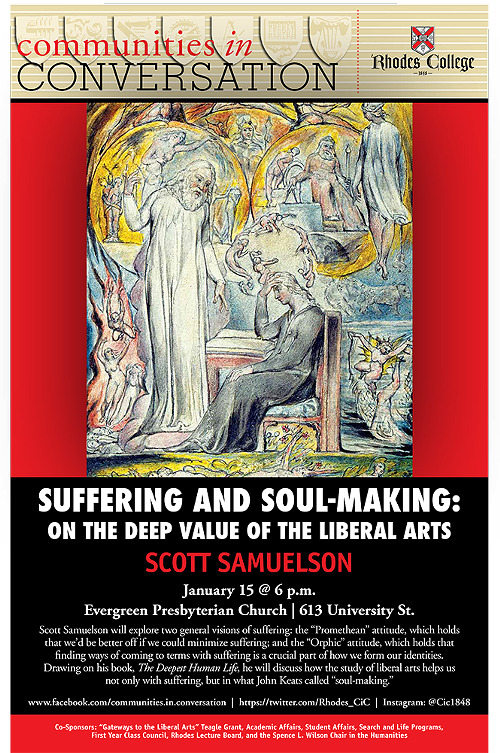Most philosophers can probably pinpoint the time and place when the big ideas first hit and the questions kept coming. Scott Samuelson, associate professor of philosophy at Kirkwood Community College in Iowa City, knows exactly when and where he got to wondering.
He was 10 years old, he was using a pillow to practice kissing, and he was imagining a classmate’s blond curls and “sea-blue” eyes. But then his consciousness “broke,” and everything suddenly “felt extremely iffy.” Why, for example, did anything exist, Samuelson asked himself. Why did he exist? And more to the point: “What great cosmic mystery led to my making smooching noises into a pillow?”
[jump]
That’s how Samuelson tells it in The Deepest Human Life: An Introduction to Philosophy for Everyone (published last year by The University of Chicago Press), and he’ll be signing copies of that book after lecturing inside the sanctuary of Evergreen Presbyterian Church, on University across from Rhodes College, on Thursday, January 15th, at 6 p.m. The lecture, titled “Suffering and Soul-Making: On the Deep Value of the Liberal Arts,” is the 2015 opening event in Rhodes’ “Communities in Conversation” series, which is free and open to the public.

“The deepest human life” is a phrase borrowed from William James, but “philosophy for everyone” is Samuelson’s own goal in The Deepest Human Life. As he writes: “This book is my attempt to bring philosophy down from its ethereal theorizing and put it back on the earth where it belongs, among wrestlers and chiropractors, preschool music teachers and undertakers, soldiers and moms, chefs and divorcees, Huck and Jim — you and me, in fact.”
Samuelson could have also added to that list his students at Kirkwood Community College, where he teaches an introductory course in philosophy, which often leaves those students befuddled rather than enlightened — and, Samuelson is willing to admit in some cases, relieved to have gotten a requirement over and done with.
There are also those students who come to him impatient to know the right answers to life’s problems but who finish the course better prepared to ask the right questions. And that’s just what Samuelson wants his students (and readers) to understand: that it’s the philosopher’s job to “live the inquiry.” Why, even Socrates, as Samuelson reminds us, lived in recognition of his own ignorance. And it’s Socrates who begins the book’s journey of philosophy, followed by Epicurus, Epictetus, Descartes, Pascal, and Kant, among others, including Islamic theologian Abu Hamid al-Ghazali. A personal journey, Samuelson calls it, that is also the journey of human civilization.
No reason, according to the author, that that journey not include a detour or two. In The Deepest Human Life, Samuelson has written four such “interludes” — essays to break up the larger narrative and to keep things down to earth. His subject matter in those interludes says it all and simply enough: laughter and tears; wine and bicycles; campfires and the sun; superheroes and zombies. Something else that says a lot: Samuelson, in addition to teaching and writing (and movie reviewing and acting as television host), serves as a sous-chef at a French restaurant in the middle of rural Iowa, so he’s no stranger to the meaning of “dead-tired” after a long shift.
Nor is he a stranger to the serious questions confronting each and every one of us, not the least of which three questions posed as chapter titles in The Deepest Human Life: “What Is Happiness?” “Is Knowledge of God Possible?” And, “What Is the Nature of Good and Evil?”
Samuelson’s students have in their own ways posed those very questions. And Samuelson the philosopher has learned from those students — often “nontraditional” students — too, and they include “harried moms and aspiring plumbers.” It may, in fact, be those moms and plumbers that Samuelson had in mind with the book’s opening chapter: “What Is Philosophy?” — an excellent question to ask whether you’re a practicing philosopher or college undergraduate. It is also a good indicator of Samuelson’s commitment to another issue: the humanities.
“Sure, it’s important that we produce some well-trained scholars and thinkers,” he recently wrote in an essay called “Finding Philosophy” (The Chronicle Review, on the website of the Chronicle of Higher Education). “It’s even more crucial that we initiate students into strong forms of thinking, reading, and writing. But the reason we should support the humanities in a general education isn’t so students can produce slick essays; it’s so they can lead examined lives. Philosophy should be able to speak to a mom in tears.” •
Questions about Scott Samuelson’s lecture on January 15th or this semester’s “Communities in Conversation” schedule? Go to the series’ Facebook page or contact Jonathan Judaken, Spence L. Wilson Chair in Humanities at Rhodes, at judakenj@rhodes.edu. For a preview of Samuelson’s thoughts, listen to Judaken’s recent interview with him at wknofm.org.